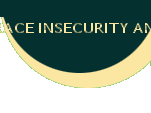EMBRACE INSECURITY AND WIN
By Uriah J. Fields
I. There's No Security
Wouldn't it be good if there were no shortages, no accidents no disappointments and everything was just as you wanted it to be? How wonderful it would be if you had only the insecurity of death rather than seemingly a million different insecurities such as financial insecurity, the fear of poverty, intellectual insecurity, the fear that you may be unloved, spiritual insecurity, the fear that God does not care about you? Even with our many illusions, rationalizations, and blinders, people generally recognize that they live in an insecure world.
History, daily events, and our projections appear to be in harmony on the uncertainty and disappointments that characterize man's journey. The great ship Titanic - believed by many, among them our leading experts, to be the ship that couldn't sink - loaded with the world's best-paying customers, the most elite, and those most deserving of security because they, as none else could afford to pay for it, and in a way assumed they had paid for a safe voyage on an unsinkable ship, were not saved. The great Titanic sank, taking with it nearly all its passengers. Political systems well endowed, having the appearances of being God-ordained, militarily superior to other nations, embracing vast domains, have like prior civilizations, more than twenty of them according to Toynbee, fallen bringing ruin and calamity to their citizens who proudly hailed and believed that "our banner will be lifted in glory forever."
Almost daily we are confronted with tragedies, sometimes real life horror stories, announcing the crash of an airplane, the constant threat of a nuclear mishap, double-digit inflation, abortion - killing of the unborn - which suggests that we may just as boldly and "honorably" decide one day in the not-too-distant future to kill off the too-old or some other not-too acceptable group. In our personal lives and in our intimate lives we are faced with child abandonment by parents, the unparalleled dissolution of marriages and the disintergration of family life. Individual are not merely disliking themselves but are disowning themselves as well. Yet, in the midst of this ever-present hazardous living people are yearning for, working for, even dying for, security. Some people, in a last attempt to bestow security which they themselves never had, may deprive themselves, toil excessively, and die early to make certain that their children will not face insecurity as they did. Some may leave treasures, with their young as if such guarantees them against life's "afflicting angels."
There is no security. There is no one to save you from the hurt and anguish, even destruction, that comes from disappointments, the loss of a loved one, physical sickness, world turmoil, societal decay and the uncerainty that is as much a part of living as breathing. No, even God can't or has not chosen to allow you the opportunity to return to Paradise, where even in our nakeness there is total acceptance by both God and man. But the cry for security is still heard inspite of the evidence and the obvious happenstance that proclaim day after day: There's no security.
Security comes from invulnerability, therefore conversely, insecurity comes from vulnerability. And since like the great Titanic there is no outer or inner surface that can withstand the turbulent waters of an angry sea, the invulnerable becomes precisely the candidate for attack, and since these are so well-armored and so dependent on their impenetrable buttressing, once penetrated those attacked become defeated because they are fighting a no-win battle. On the other hand insecurity means there is an openness, transparency, and availbility to life. Insecurity conforms to reality which says to us there are no guarantees, no warranty, not even for a day, no definite promises that things will be well and no contract ensuring that we will be compensated for our damages and losses. What are we to make of this? How are we to function in such a world?
Obviously one would think that any sane society, or individual for that matter, would accept reality - admit that the law of insecurity like the law of gravity is the law of the land. Accepting this, one would suppose that we would no more seek to contest the law of insecurity than we would the law of gravity. But this is not the case, and like holding onto many other illusions people are bringing upon themselves depression, frustation, anxiety, physical sickness, and premature death. The law of human insecurity is an ultimate law of life because it negates security. It is absolute because it concerns present reality... The absolutism of the law of insecurity lies in its power to be fully in present reality, to discover what is, accept what is, and experience present reality. Therefore, human insecurity can never become fanatical in a fight for security, or cynical under the impact of guarantees, reserves, survivor benefits, bomb shelters, defense systems, and post-dated Promised Lands.
Despite man's tenacious clinging to security, his security entrapment and what appears to be an unwillingness to extricate himself, from time to time each of us is compelled to say, if only for a fleeting moment, there is no security. But this is not adequate to inspire most to break free from the security trap. We must affirm and accept the incontrovertible fact that: There is no security
Once we accept this fact we become reality-oriented, vulnerable, able to risk, to change and flow. We cease to prepare for tomorrow, instead we live fully today. Reources that may have been put away for tomorrow are untilized in the happenings of today. Storing away goods for our children for tomorrow ceasses to be a concern or a practice. We give to our children today the only authentic gift we have to give, and that is sharing ourselves with them. When we accept the insecurity philosophy our entire lives change.
Only the security-minded need accept dogmas, follow traditions, adhere to consensus or believe in systems. Living with insecurity is liberating, it frees us from many obligations, and leaves us free to, as Jesus put it,"Take no thought for tomorrow," and equally as important, respond to the now-situation without any regard for tradition, law, opinions of others, or fear of the untried. Freedom means never having a desire for security.
Again, we have found that people can remember these reality awareness signals or what may be called reality sensors, when they associate them with the letters that make up the word "Insecurity." This is the acrostic for Insecurity:
I-nspired
N-eutral
S-ecurity
E-ffortless
C-arefree
U-niversal
R-esponsive
I-rresistible
T-rusting
Y-ielding
II. Quality Living with Less and with Insecurity
Security, or more correctly, the security-myth, is beings swiftly replaced by the "consciousness of insecurity." Our once esteemed securities - social security, economic security, and national security - are being dismissed as relics of the past or impossible dreams.
With the security egg having been cracked and the miscarriage or excrement from it scattered upon the horizon of our experience the death of security is now in visible and gripping evidence. Indeed, all who possess the "consciousness of security" whose companion is the "consciousnes of scarcity" are experiencing in one way or the other, supply deficiencies or decrease. An increasing number of people have less now than before and many others expect to have less tomorrow than they presently possess. There is not anticipation that the trend will be reversed. If a person can be secure only when he has abundance then he is insecure when he has only the essentials or less than what is required for his ego-gratification.
During the last several centuries for some Americans and the last three generations for many more Americans the American Dream has been realized. For many others there was hope, based on abundance, excesses, waste and the yearly arrival of new millionaires. The confiscation of the land we call America from the Indians, the enslavemet of Blacks from Africa in Amercia world immperialism and the scientific and technological revolution have all contributed to the crystallization of the security myth and to personal economic success for many who profited from a capitalistic system which is characterized by political intrigue and exploitation of the majority for the gratification of the minority.
Today, resources have decreased and America no longer has control of and access to as many resources as she had in the past, pollution has increased creating new health problems and the nuclear arms race is proceeding at an unbelievable pace with no check in sight bleeding people of life no less than war itself. In our preparation for war we have the greatest cost ineffectiveness ever recorded in the name of National Security. Unemployment, inflation, monoply-like corporate agencies and a pessimism syndrome mark an end to the American Dream and are ushering into existence an era whch many view as an approaching nightmare. The once "secure" are now saying, "We don't have any security!" and "We don't know what to do!"
With resoluteness and absoluteness Americans from all walks of life are declaring the precariousness of their condition. They are insecure. They know it and they are beginning to accept it.
Now that it is nationally agreed that the "state of the union" is insecurity, a new philosophy is necessary. This philosophy hopefully will be as follows: Our quality of life can be better with less and with insecurity.
Obviously, reclaiming faith in the American Dream is not the answer because it is precisely this "bad faith" in even a worse system that accounts for the present disillusionment. While having "all things in common that are essential for good living" or the "redistribution of wealth with equity" is desirable the individual cannot wait for a society which is steeped in tradition, obsessed with greed and immobilized by fear to become transformed before he experiences quality living as a lifestyle. Despite the fact there is a consciousnes of insecurity which is the outgrowth of the cracking of the security myth people are not deeply enough aware of reality nor do they care enough to collectively unite for their own common good. But this need not prevent the individual from having quality life with less and with insecurity.
In order to have quality life with less and with insecurity the individual must have quality living consciousness raising. First, this means that the person has to be aware of reality and face it as it is: What is, is. Reality says the state of existence is insecurity. Second, he has to know that life does not consist of the abundance of things or of things. Acceptance of this fact means a de-emphasizing of the material and a maximization of the spritual. Thrid, selectivity based on quality living consciousness raising has to be applied in total living - in buying and selling, in food consumption, in intimate relationships in communication, in transportation and in philosophy. Fourth, be free to do at all times that which is personally beneficial and socially redeeming.
Quality living consciousness raising results in quality living in a world such as ours where less, whether we know it or not, is better than more because more magnifies objects and things while minimizing the self. More makes the external more important than the internal. In our world of reality, insecurity is a blessing because apart from not embracing the myth of security, it makes it unnecesary for a person to protect his interests since there is the awareness and acceptance that nothing is certain, nothing remains and nothing is as important as having one's own life. Apart from this it becomes crystal clear that the individual has everything he needs in order to live gloriously and to be healthy and happy in the now.
{Taken from: "Be the Best: Do It Easy, Do It Now" by Uriah J. Fields, pp. 32-39}
<<<<<<<<<<>>>>>>>>>>


















































































































































